Advertisement
How This Summer's 'Severe' Drought Is Affecting Mass. Farmers And Their Crops
Resume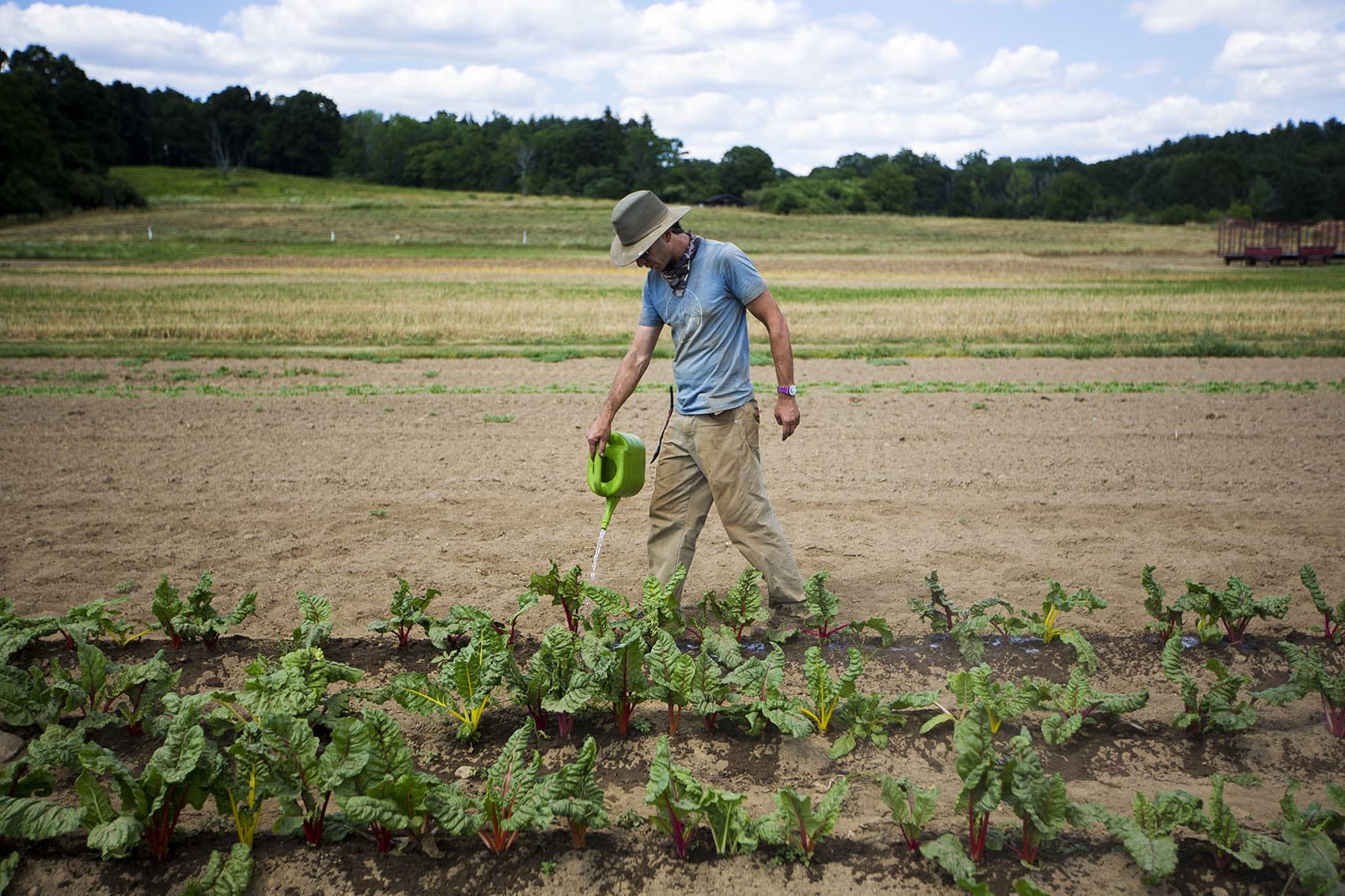
New figures from the U.S. Drought Monitor show 40 percent of Massachusetts is in a state of "severe drought." That’s up from 33 percent last week.
The dry, punishing weather is having an impact on farmers and some of the vegetables you'll find at farmers markets.
'The Weather Is Tough'
On a 90-degree afternoon, shoppers at the Copley Square Farmers Market take shade under white tents while they peruse the summer bounty. Despite the enduring drought, the tables are piled high with colorful produce, including zucchini, lettuce and blueberries.
But then, there’s the corn. It’s looking a little puny.
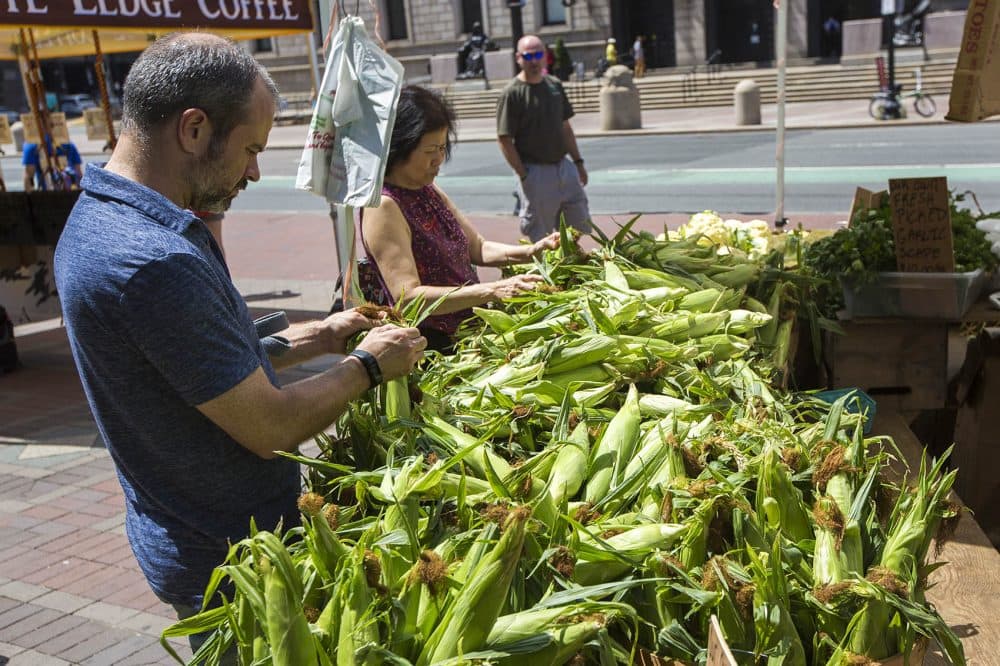
Raymond Berrick, of Dick’s Market Garden in Lunenburg, is offering more ears for the same price. And customer Sara Matzin, a supporter of local farmers markets, is buying.
“I’m seeing that if I buy six he’ll give me seven,” she says with a little laugh, “because they’re smaller.”
For Matzin the deal on corn is bittersweet. Sure, she admits it’s nice to get more ears for the same price. “But it’s tough,” she acknowledges. “The weather is tough.”
Berrick concurs, saying the 200-acre farm in Lunenburg is sunbaked.
“It is one of the driest years I’ve ever seen, since I’ve been here 30 years,” he says.
For Dick's Market Garden — where the cornfields aren't irrigated — dry weather means petite corn kernels. Berrick says other crops that are irrigated are doing fine, but that hydration comes at a cost. The summer water bill, he tells me, could be upwards of $20,000.
Bucket Brigades
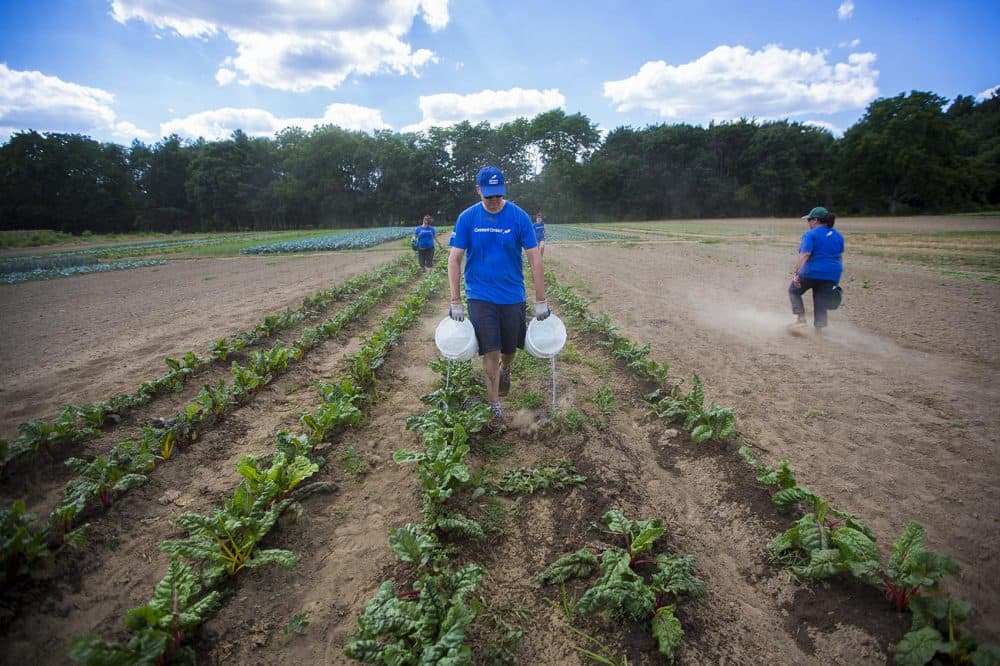
At other Massachusetts farms, the drought translates to more work getting water to the fields holding other crops. This is particularly true at the Mass. Audubon's Drumlin Farm in Lincoln, where irrigation is not part of their growing program.
When we visit, assistant farmer Sarah Lang is deploying about a dozen, dirt-covered corporate volunteers to help water 200-foot-long beds of string beans and Swiss chard by hand, bucket-brigade style.
“Full buckets down this side, empty buckets down the other,” Lang directs. “We’ll just get a line going. We’re just gonna do a bucket mob, so everybody can go back and forth.”
The group passes brimming plastic and metal vessels through the dusty rows after filling them from hundred-gallon drums in the back of a pickup.
On this day crops manager Matt Celona is especially grateful for the volunteers from the Waltham company Constant Contact. He says Drumlin Farm grows about 50 different crops for retail, area restaurants and the farm share program (or CSA, a.k.a. Community Supported Agriculture).
“It’s a struggle for us,” Celona says. “We had rain in the first week of June and a little bit in the first week of July, but totaling probably just over an inch for the whole June and July — which is not enough. Our whole philosophy here at Drumlin is based on not irrigating but instead focusing on building organic matter in the soil.”
They do that by managing the soil carefully with compost, cover crops and periods of rest. Celona says the rich, tended soil traps moisture from rainfall and holds onto it. But this year that process is being challenged.
“Now we’re seeing some wilting in winter squash, beans, celeriac, summer squash. Some eggplant doesn’t look good,” he says.
The farmer hopes dumping water on the wilted string bean plants will help save them. This is the first time in Celona's 11 years at Drumlin that he's resorted to mass hand-watering. The drought is causing Celona to wonder if he should’ve put an irrigation system in place years ago.
“Who knows if it’s a one-year spike, then maybe we can go back to what we were doing with confidence,” he says, “but right now it’s a troubling time.”
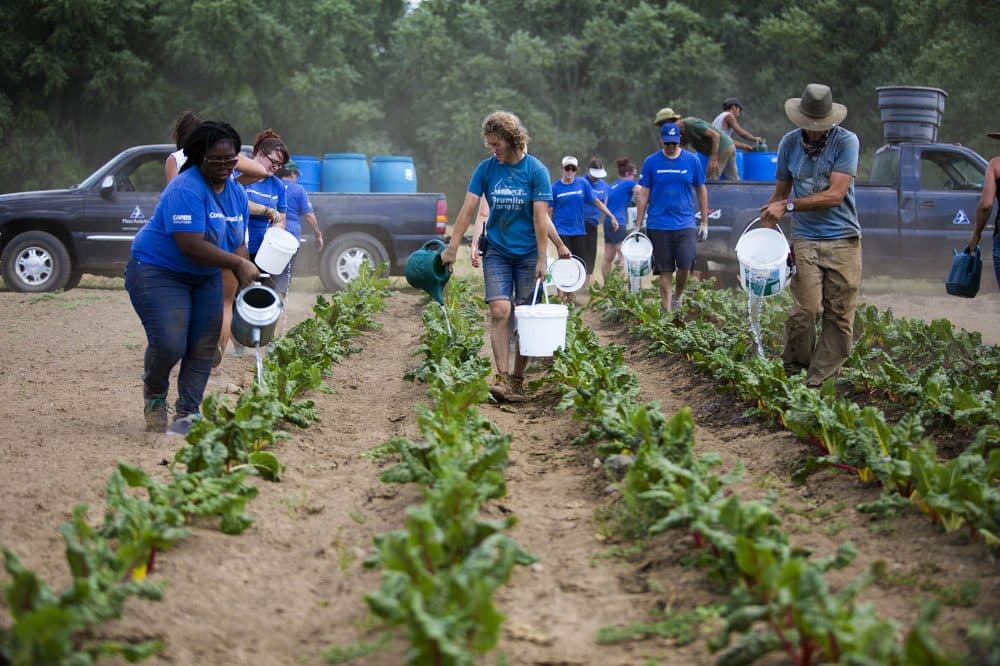
'It's Stressful On The Farmer' Too
Katie Campbell-Nelson -- a vegetable production educator at UMass Amherst’s Center for Agriculture, Food and the Environment -- is concerned about the drought’s impact on the state’s agricultural community.
“Farmers have to invest a lot of labor into irrigating crops they normally don’t have to,” she says.
Campbell-Nelson writes a newsletter to support farmers, and has been reaching out to them about the drought. While she hasn’t heard about many bucket brigades, she does say a lot of farmers are trucking water to remote fields and engineering other ways to hydrate their fields.
“The drought isn’t just stressful on the crops, it’s stressful on the farmer,” Campbell-Nelson says, “because it’s just exhausting to be out there in this heat and laying irrigation pipe. It’s also a matter of whether or not they’re able to invest the time and resources into getting the water to their crops.”
Campbell-Nelson says water is available to both urban and rural farmers, and she’s been encouraging farmers to irrigate this summer. In the future she expects more weather extremes and more weather-related problem solving because of climate change.
And she says the learning curve can be steep for farmers who aren’t used to irrigation systems. Chris Kurth, at Siena Farms in Sudbury, is one of them.
“We’ve been buying pumps and drip tape and irrigation line all summer long — week by week — as we keep watching the radar but missing the storms,” he says behind his stand at the Copley Square Farmers Market.
Kurth says his team has been devoting a lot of time and money into developing new irrigation systems this year. Usually the issue for his farm in the Sudbury River Valley is too much precipitation.
“I’ve tried everything to make it rain,” he says. “I’ve tried optimism, I’ve tried pessimism. I’ve tried religion, I’ve tried anarchy — it hasn’t worked yet.”
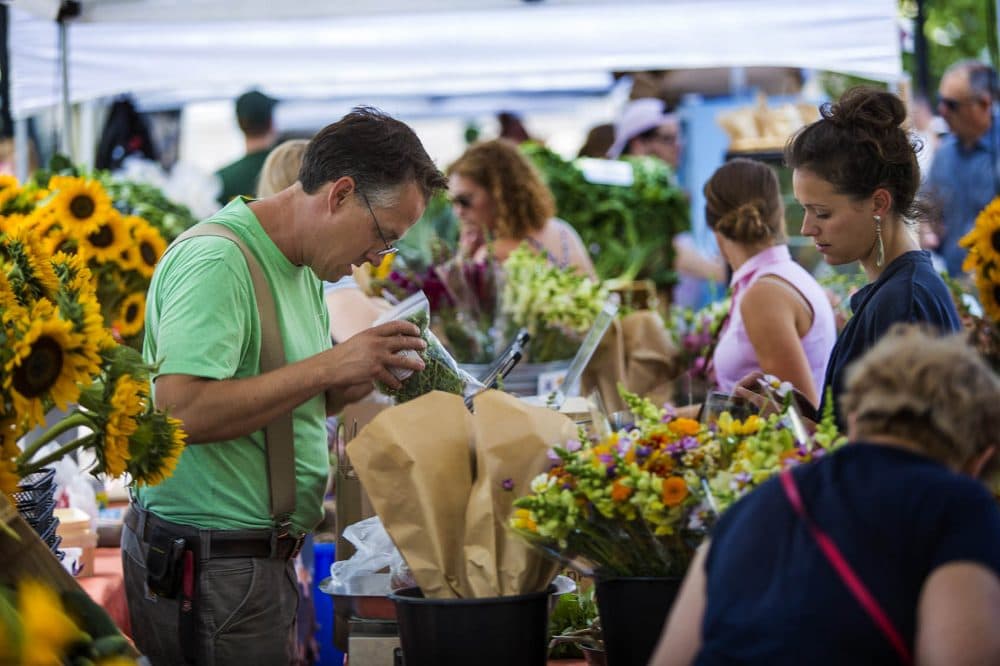
Because of the drought Kurth says he's lost most of the fava beans and shelling peas, but the fruits and veggies on display in Copley Square are stunning. Some plants are thriving, Kurth says, especially “hot crops” that love sun and heat, like tomatoes. He points to some other drought-related “silver linings,” including no infamous late-season blight, and weed production is down.
Looking ahead, this farmer of 20 years echoes Celona’s concerns about the fall and winter crops that are normally planted through September, including squashes and the root vegetables for cellar storage and retail.
“Those crops aren’t planted yet and we’re basically stalled out on planting anything for the fall that’s not already in the ground until we get some rain,” Kurth explains.
But, he adds, this summer’s drought and Mother Nature’s fickle, unpredictable M.O. is par for the course when you’re a farmer.
“It’s an adventure — not one that we would’ve picked out for ourselves this year — but at the end of the day that’s part of the draw for me as a farmer. It’s coming face-to-face with the things that you can’t control about nature. And so, let it rain,” he says with a laugh.
Kurth and the other farmers are eyeing the skies — and doing rain dances — hoping the weekend forecast is accurate. At this point any rain is welcome.
Correction: Due to an editing error, an earlier version of this post said Sara Matzin wasn't buying corn at the farmers market; she was. Siena Farms was also misspelled in one instance. We regret the errors.
This article was originally published on July 28, 2016.
This segment aired on July 28, 2016.
